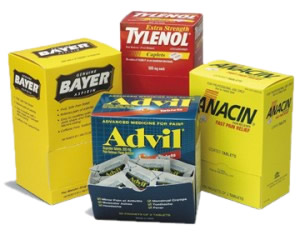Article contributed by Jacquelyn Ekern, MS, LPC and Crystal Karges, MS, RDN, IBCLC
 Over-the-counter (OTC) pain medications are highly sought and commonly used drugs for managing every day ailments like headaches, back pain, sore muscles and more.
Over-the-counter (OTC) pain medications are highly sought and commonly used drugs for managing every day ailments like headaches, back pain, sore muscles and more.
Because of the ease of access to these pain medications, patient health can be jeopardized if individuals are unable to safely self-administer over-the counter drugs. Without the supervision of a physician or pharmacist, over-the-counter drugs can easily lead to serious health risks if not used appropriately.
Potential Health Hazards from OTC Pain Medication
Researchers have shown that misuse of over-the-counter pain medication can in fact lead to potential health threats. A study published in the Journal of General Internal Medicine found that nearly 25% of participants were at risk of overdosing on pain medication using a single over-the-counter acetaminophen product (such as Tylenol) [1].
In this same study, researchers found that nearly half of participants were at risk of overdosing by “double-dipping” with two acetaminophen containing products [1]. From 1998 to 2003, acetaminophen was the leading cause of acute liver failure in the United States, with 48% of acetaminophen-related cases connected with accidental overdose [2]
Effects from Abuse of OTC Pain Medications
Serious adverse effects that may result from the misuse of over-the-counter pain medications include:
- Gastrointestinal distress
- Jaundice
- Liver failure
- Drowsiness
- Coma
- Death
Overdoses with over-the-counter pain medications, such as acetaminophen or ibuprofen, can happen accidently, especially if the medication is coming from several different sources. Symptoms of overdose may not become apparent for twelve hours or more, which may cause an individual to ingest more medication without realizing that a toxic limit has already been consumed.
Take These Precautions When Using OTC Pain Medications
While over-the-counter medications can be helpful in relieving and managing pain symptoms, it is important to carefully regulate the use of these drugs to prevent overdose and misuse. Here are some helpful tips to keep in mind if you or a loved one commonly utilizes over-the-counter pain medications:
-
Be aware of the dosage and types of medications taken:
When multiple medications are being used in addition to over-the-counter drugs, it is critical to carefully track dosages and times at which medications are consumed. Over-the-counter medications can produce dangerous side effects if take in combination with other supplements, prescription medications, or alcohol. Be sure to understand all possible side effects and drug interactions and speak with your doctor about how to best manage multiple medications.
-
Understand maximum dose warnings:
It is important to closely adhere to package or label instructions given with any over-the-counter drug. Identify the active ingredient, such as acetaminophen or ibuprofen, as well as the dosage. Products and ingredients can vary widely among different medications, so it is critical to read warnings to understand what is considered the maximum dosage in a period of time.
-
Learn the signs and symptoms of overdose/overuse:
Physical symptoms, such as nausea, vomiting, blurred vision, dizziness, or confusion may indicate overdose of an over-the-counter medication. Chronic use of over-the-counter drugs can be counter-productive to your health and wellness. If you are suffering with ongoing pain that is not relieved by the recommended dosage of an over-the-counter medication, see your doctor for further evaluation.
OTC Pain Medications Are Effective When Used Properly
Over-the-counter drugs can be effective in managing pain or illnesses if used as recommended. Because of the accessibility of these medications, overuse and overdose can easily result, leading to adverse health consequences.
If you believe that you or a loved one is struggling with addiction to over-the-counter pain medications, take a proactive step towards getting help by reaching out to a health professional today.
References:
- [1]: Springer Science+Business Media. "Misuse of over-the-counter pain medication is potential health threat." ScienceDaily. ScienceDaily, 30 May 2012. <www.sciencedaily.com/releases/2012/05/120530100430.htm>.
- [2]: Larson AM, et al. Acute Liver Failure Study Group (ALFSG). Acetaminophen-induced acute liver failure: results of a United States multicenter, prospective study. Hepatology, 2005 Dec; 42(6): 1364-72.
Last Updated & Reviewed By: Jacquelyn Ekern, MS, LPC on June 5th, 2014
Published on AddictionHope.com, OTC Drug Help Online
